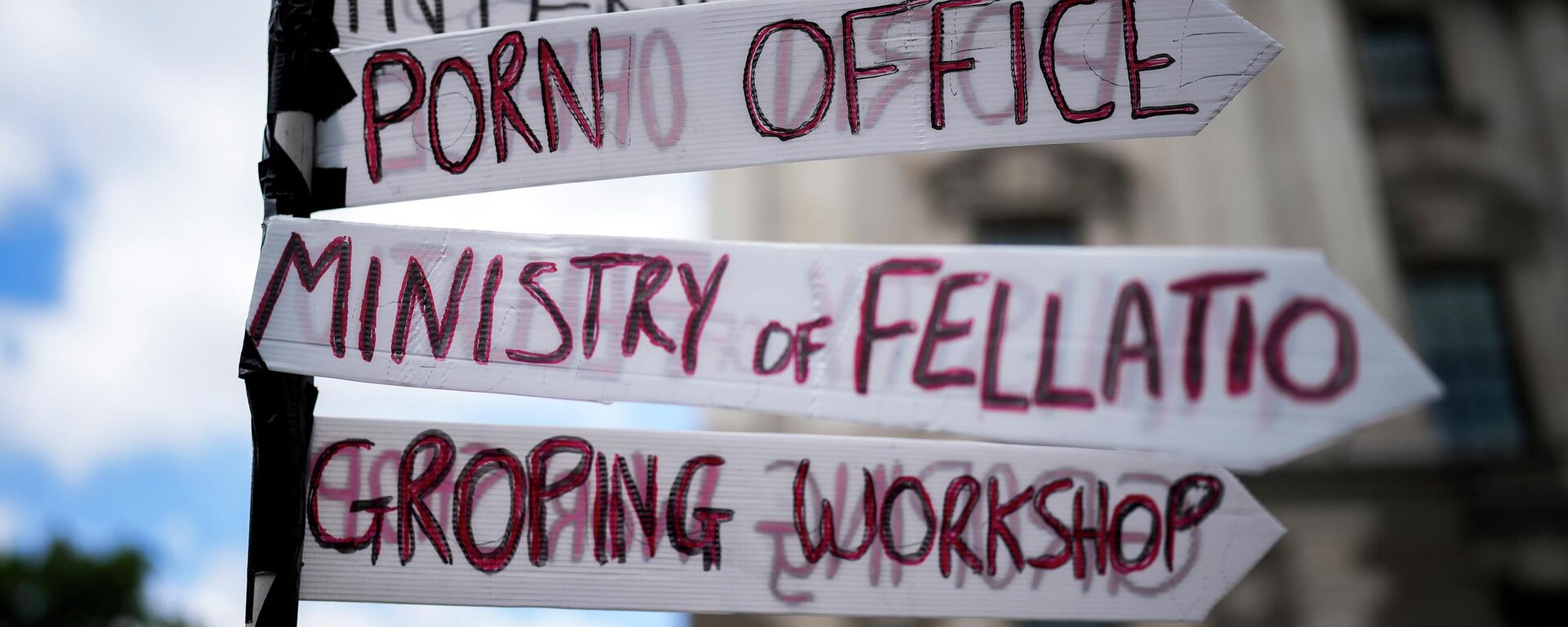https://sputnikglobe.com/20220706/academics-see-no-clear-exit-for-johnson-or-replacement-pm-1097023331.html
Academics See No Clear Exit for Johnson or Replacement PM
Academics See No Clear Exit for Johnson or Replacement PM
Sputnik International
UK Prime Minister Boris Johnson has survived a series of earlier scandals and internal party battles almost since he first took office in the summer of 2019... 06.07.2022, Sputnik International
2022-07-06T17:44+0000
2022-07-06T17:44+0000
2023-05-28T15:20+0000
boris johnson
1922 committee
partygate
keir starmer
united kingdom (uk)
https://cdn1.img.sputnikglobe.com/img/07e6/07/06/1097016042_0:40:3073:1768_1920x0_80_0_0_6febb82ccebeaa24db0d99e80a33014d.jpg
British Prime Minister Boris Johnson is fighting for his political life, but his opponents have few options for replacing him — so say two senior academics.Calls for Johnson to go have reached fever pitch since Chris Pincher, the Conservative MP he appointed as deputy chief whip in February, was sacked for drunkenly groping two men at a posh private members' club in London.This week, it emerged that Johnson had been informed of earlier sexual assault claims against Pincher before he promoted him — leaving Cabinet colleagues embarrassed at having to defend the ever-changing official line.Laura McAllister, professor of public policy at the Wales Governance Centre, told Sputnik nobody should take Johnson's political demise for granted.The academic points to Johnson's survival of the scandals around his advisor Dominic Cummings, "Partygate", and his handling of the COVID-19 pandemic before the Pincher affair. But she conceded that the spate of ministerial resignations led by Sajid Javid as health secretary and Rishi Sunak as chancellor of the exchequer were "hugely significant.""Two Cabinet members who sat in Cabinet yesterday morning had resigned without warning by the evening," the professor stresses. "I think it's also fair to say that both of those individuals are thinking about their own potential bids to stand as the next leader of the Conservative Party and therefore timing is very much predicated on that."McAllister says things have changed since the days of Margaret Thatcher, who resigned in 1990 after failing to win a leadership challenge by an overwhelming margin."He still has a base of support, of course, even though that’s dwindling away now," she adds.The academic also doubts that a general election would break the political deadlock."Whilst Labour are a few percentage points ahead, they clearly aren’t making sufficient headway to be confident of winning a majority," McAllister says. "The best they could hope for in the current polling would be a minority government and potentially having to seek coalition partners." Those could include the Liberal Democrats and the Scottish National Party (SNP), who would demand a repeat of the 2014 independence referendum as the price of their support. Ironically, independence for Scotland and its 59 parliamentary seats would shore up the Conservative majority in Westminster and make Labour nigh on unelectable."[Labour leader] Keir Starmer has already ruled out any deals with the SNP for obvious constitutional reasons, and therefore with Plaid Cymru in Wales," she points out. "So it seems unlikely that that route to power is open."McAllister believes a new Tory leader would at least enjoy a "honeymoon period" bounce in the polls.No 'Coup', But Then Who?Mark Garnett, a politics professor at Lancaster University and author of the books "The British Prime Minister in an Age of Upheaval" and "From Anger to Apathy: The British Experience" thinks Johnson has no hope of survival. But he does not see how the party can push the PM out if he refuses to jump.He says Javid and Sunak's resignations are "serious blows" to Johnson, but they are only "symptoms of a more general crisis of leadership."But the professor does not see the near simultaneous resignations as a "coup," stressing: "The most surprising thing is that ministers have tolerated Johnson for so long."While Sunak was seen as the favourite to succeed Johnson just six months ago, "he is being held at least partly responsible for the country's economic problems and his chances of becoming prime minister are now very remote," Garnett says. "Sajid Javid's chances are greater, but Conservative members (who make the final decision) seem more attracted to the defence secretary, Ben Wallace, who has not resigned."The academic believes MPs are worried that Johnson is now an "electoral liability" who could cost them their seats at the next general election. "The party has just lost two by-elections in crucial seats, and the main reason given by those who voted against them was Boris Johnson's leadership," he stresses.But the problem of how to remove Johnson from office if he does not quit remains."Currently the party's rules make it impossible to hold a vote of confidence for another year," Garnett points out. "It is very likely that those rules will be changed within the next ten days." But he believes if a vote could be held now, "Johnson would certainly lose and be forced to resign."
https://sputnikglobe.com/20220706/beleaguered-bojo-battles-with-opposition-at-weekly-pms-questions-1097012954.html
united kingdom (uk)
Sputnik International
feedback@sputniknews.com
+74956456601
MIA „Rosiya Segodnya“
2022
James Tweedie
https://cdn1.img.sputnikglobe.com/img/07e4/08/1c/1080307270_0:3:397:400_100x100_80_0_0_7777393b9b18802f2e3c5eaa9cbcc612.png
James Tweedie
https://cdn1.img.sputnikglobe.com/img/07e4/08/1c/1080307270_0:3:397:400_100x100_80_0_0_7777393b9b18802f2e3c5eaa9cbcc612.png
News
en_EN
Sputnik International
feedback@sputniknews.com
+74956456601
MIA „Rosiya Segodnya“
Sputnik International
feedback@sputniknews.com
+74956456601
MIA „Rosiya Segodnya“
James Tweedie
https://cdn1.img.sputnikglobe.com/img/07e4/08/1c/1080307270_0:3:397:400_100x100_80_0_0_7777393b9b18802f2e3c5eaa9cbcc612.png
boris johnson, 1922 committee, partygate, keir starmer, united kingdom (uk)
boris johnson, 1922 committee, partygate, keir starmer, united kingdom (uk)
Academics See No Clear Exit for Johnson or Replacement PM
17:44 GMT 06.07.2022 (Updated: 15:20 GMT 28.05.2023) UK Prime Minister Boris Johnson has survived a series of earlier scandals and internal party battles almost since he first took office in the summer of 2019, including criticisms of the government's handling of the COVID-19 pandemic and flouting of lockdown rules by his staff.
British Prime Minister Boris Johnson is fighting for his political life, but his opponents have few options for replacing him — so say two senior academics.
Calls for Johnson to go have reached fever pitch since
Chris Pincher, the Conservative MP he appointed as deputy chief whip in February, was sacked for drunkenly groping two men at a posh private members' club in London.
This week, it emerged that Johnson had been informed of earlier sexual assault claims against Pincher before he promoted him — leaving Cabinet colleagues embarrassed at having to defend the ever-changing official line.
Laura McAllister, professor of public policy at the Wales Governance Centre, told Sputnik nobody should take Johnson's political demise for granted.
"He survived so much in a way that few other politicians have ever managed to, particularly those in senior public office and prime minister," McAllister says. "He operates by a completely different set of rules and principles and ethics, which we would assume would be his undoing, but actually in reality he seems to have been able to ride the storm."
The academic points to Johnson's survival of the scandals around his advisor Dominic Cummings, "Partygate", and his handling of the COVID-19 pandemic before the Pincher affair. But she conceded that the spate of
ministerial resignations led by Sajid Javid as health secretary and Rishi Sunak as chancellor of the exchequer were "hugely significant."
"Two Cabinet members who sat in Cabinet yesterday morning had resigned without warning by the evening," the professor stresses. "I think it's also fair to say that both of those individuals are thinking about their own potential bids to stand as the next leader of the Conservative Party and therefore timing is very much predicated on that."
McAllister says things have changed since the days of Margaret Thatcher, who resigned in 1990 after failing to win a leadership challenge by an overwhelming margin.
"[T]here was a much stronger Cabinet code, a ministerial code that was upheld broadly, or if it wasn't upheld, then there were consequences," she says. "That's not the case now, and it seems very likely that Johnson will not resign of his own accord."
"He still has a base of support, of course, even though that’s dwindling away now," she adds.
The academic also doubts that a general election would break the political deadlock.
"Whilst Labour are a few percentage points ahead, they clearly aren’t making sufficient headway to be confident of winning a majority," McAllister says. "The best they could hope for in the current polling would be a minority government and potentially having to seek coalition partners."
Those could include the Liberal Democrats and the Scottish National Party (SNP), who would demand a repeat of the 2014 independence referendum as the price of their support. Ironically, independence for Scotland and its 59 parliamentary seats would shore up the Conservative majority in Westminster and make Labour nigh on unelectable.
"[Labour leader]
Keir Starmer has already ruled out any deals with the SNP for obvious constitutional reasons, and therefore with Plaid Cymru in Wales," she points out. "So it seems unlikely that that route to power is open."
McAllister believes a new Tory leader would at least enjoy a "honeymoon period" bounce in the polls.
"And who knows, were Johnson to be defenestrated, it might be that a new leader might choose to capitalize on the honeymoon period and call an earlier election," she speculates.
Mark Garnett, a politics professor at Lancaster University and author of the books "The British Prime Minister in an Age of Upheaval" and "From Anger to Apathy: The British Experience" thinks Johnson has no hope of survival. But he does not see how the party can push the PM out if he refuses to jump.
He says Javid and Sunak's
resignations are "serious blows" to Johnson, but they are only "symptoms of a more general crisis of leadership."
"Johnson has been involved in too many incidents which raise questions about his personal integrity," Garnett says, with ministers told to defend the PM against allegations that turned out to be true. "In effect, they have been asked to lie in public on his behalf. Their patience has finally snapped."
But the professor does not see the near simultaneous resignations as a "coup," stressing: "The most surprising thing is that ministers have tolerated Johnson for so long."
While Sunak was seen as the favourite to succeed Johnson just six months ago, "he is being held at least partly responsible for the country's economic problems and his chances of becoming prime minister are now very remote," Garnett says. "Sajid Javid's chances are greater, but Conservative members (who make the final decision) seem more attracted to the defence secretary, Ben Wallace, who has not resigned."
The academic believes MPs are worried that Johnson is now an "electoral liability" who could cost them their seats at the next general election. "The party has just lost two by-elections in crucial seats, and the main reason given by those who voted against them was Boris Johnson's leadership," he stresses.
But the problem of how to remove Johnson from office if he does not quit remains.
"Currently the party's rules make it impossible to hold a vote of confidence for another year," Garnett points out. "It is very likely that those rules will be changed within the next ten days." But he believes if a vote could be held now, "Johnson would certainly lose and be forced to resign."





